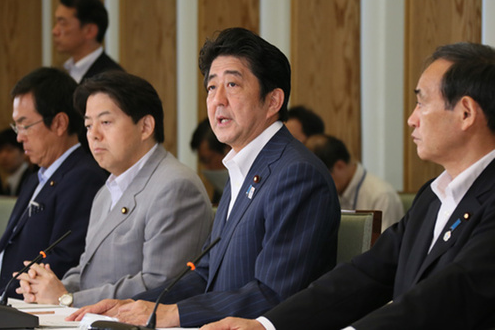Japanese Prime Minister Shinzo Abe’s landslide victory in last month’s general election has confirmed that plans to internationalise the country’s higher education system will go forward.
News and business analysis for Professionals in International Education
Have some pie!
Internationalisation key to Japan’s Abeducation

Around £284 million (¥43.2 billion) has been allocated toward initiatives in “five pillars” outlined by Education Minister Hakubun Shimomura in June including increasing inbound and outbound mobility, improving universities’ ranking status and boosting academic collaborations.
“Without strengthening universities, we cannot expect further growth, so all Japanese universities should transform themselves into world universities,” said Shimomura.
Doubling the amount of Japanese students overseas to 120,000 is central to plans
Doubling the number of Japanese students overseas to 120,000 is central to plans, boosted by greater financial support from the government.
“MEXT is facilitating study abroad for Japanese people, establishing a new joint mechanism for the public and private sectors to ease the financial burden of studying abroad,” Dr Osamu Aruga, Director of the Office for International Planning at Japan’s Ministry of Education, Culture, Sports, Science and Technology (MEXT) Higher Education Bureau, told The PIE News.
Shimomura also announced increased support for foreign students to study in Japan. According to Project Atlas, there were 137,756 international students enrolled in Japanese universities in 2012, up from 123,829 in 2008 however far from meeting the target outlined in the Global 30 initiative to have 300,000 international students enrolled by 2020.
In order to reach the 300,000 goal, Aruga confirmed that the government “will increase scholarship support for overseas students and advance strategic acceptance of highly capable foreign students from priority areas”.
Yukari Kato, Executive Vice President at Ryugaku Journal Inc., a study abroad agency operating since 1971, says scholarships are essential to increase the number of international students in Japan. “As the Japanese economy becomes more severe, the rising cost of studying abroad is becoming a major obstacle,” she told The PIE News.
“The number of courses that it is possible to take in English has increased, but is small in comparison to other countries”
She added that the small offering of English language courses is another obstacle to increasing foreign students in Japanese institutions.
“So far, the Japanese government has put measures in place to increase the number of students coming from overseas to study in Japan with financial support…but students must be able to speak Japanese in order to study in Japan in the first place.
“The number of courses that it is possible to take in English has increased, but is small in comparison to other countries.”
Additional funding will go toward increasing the profile and quality of Japanese institutions. The government aims to have 10 Japanese universities ranked in the global top 100 within the next ten years compared to the current two, Tokyo University and Kyoto University
Shimomura also outlined three secondary school initiatives to increase globalisation across the education sector. They include enhancing elementary school English language teaching; establishing enhanced global high schools that promote a broad range of subjects and problem solving skills; and increasing the number of International Baccalaureate high schools.
Still looking? Find by category:


